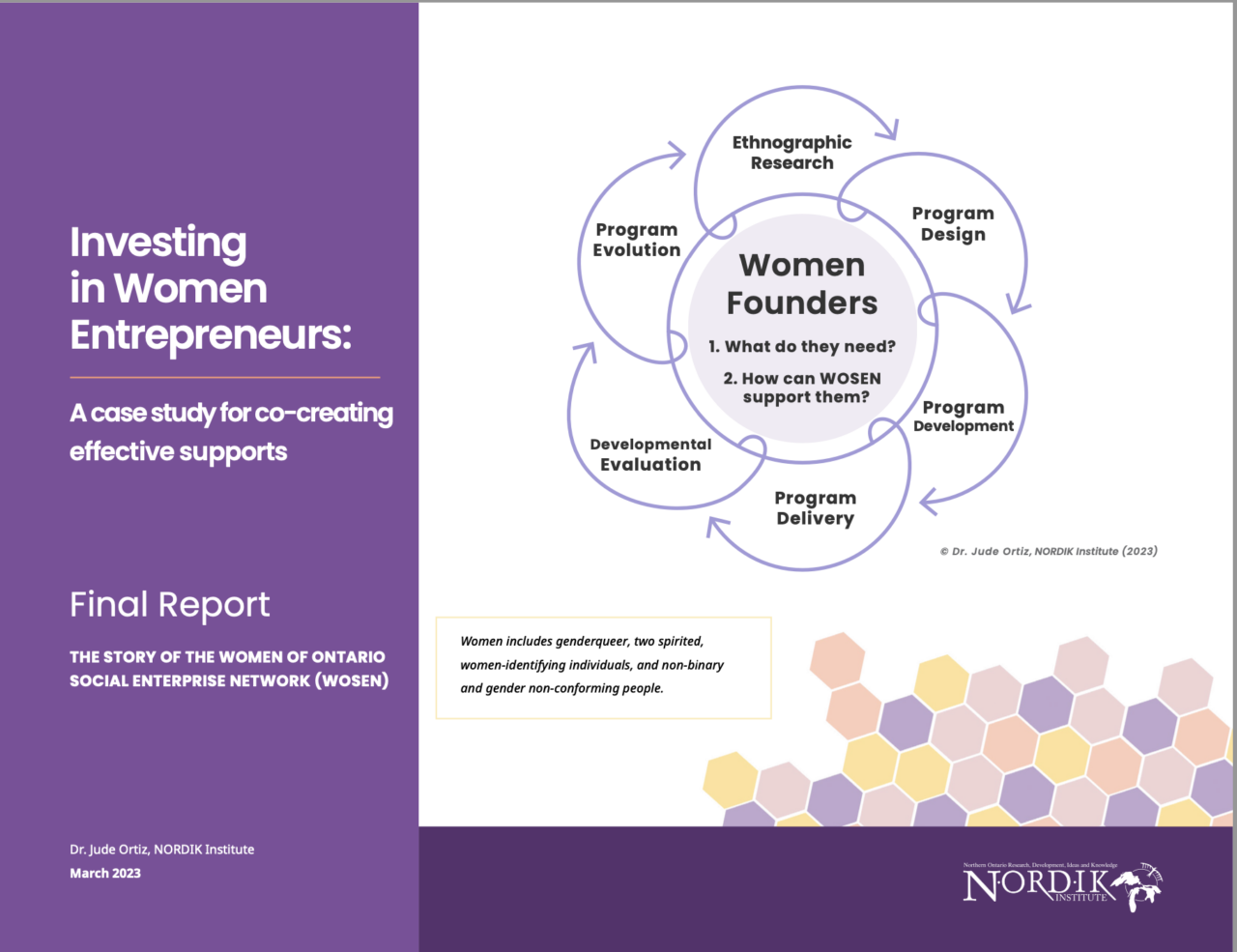The Women Entrepreneurial Strategy (WES) has provided important investment in women who have business aspirations. The recent WES-funded report, The State of Women Entrepreneurship in Canada indicates that overall, many of the current offerings do not meet the needs of women, in general, and diverse women in particular. They also note that the majority of ‘mainstream’ business organizations’ offerings that are targeting equity-seeking founders are of limited utility as these organizations have not embraced policies and processes in overcoming systemic barriers within their operations.
The Women of Ontario Social Enterprise Network’s (WOSEN) answered the call for the development of effective women’s entrepreneurial supports by redesigning the ecosystem’s approach to creating and delivering programming and services while supporting organizations in moving towards centring equity. The project’s final report, Investing in Women Entrepreneurs: A case study for co-creating effective supports provides the sector with evidence-informed processes on ‘how to’ develop an equity-centric social entrepreneurship ecosystem. The initiative is contextualized within systems change and community economic development principles, offering a critical analysis of ways of effectively building, enhancing and expanding equity, and ‘how well’ strategies work — the impact and responses in addressing systemic barriers diverse women entrepreneurs encounter.
Dr. Jude Ortiz, NORDIK Institute’s Research Coordinator who led the Developmental Evaluation component of the project states, “WOSEN was intentionally grounded in a framework of equity-centred collaboration, principles-focused evaluation and social impact measurement. It engaged founders and ecosystem supporters in dynamic, collaborative and co-creative approaches that shifted mindsets, and built trust and capacity for investing in effective supports for women founders.”
WOSEN’s work reveals the significant role collaborative and co-creative processes contribute to building trust, shifting mindsets and identifying innovative equity-centred pathways forward. It illustrates ‘how to’:
- Collaborate to surface what founders needed to participate and prosper in business;
- Build an ecosystem of trust to co-create effective programing;
- Assess the progress and impact of this work; and,
- Increase the effectiveness of investment in women’s entrepreneurship.
WOSEN partners consider their collaborative and responsive approach a case study of a successful model for investing in women and creating the entrepreneurial infrastructure for them to prosper. They suggest that this model could be scaled to support others in advancing equity by building new paradigm capacity such as co-leadership, co-creation and emergent, reflective and participatory practices in developing resources, networks and pathways forward.
The collaborative supported 1,175 participants, residing in over 142 urban, rural and First Nation communities across Ontario and assisted women founders in unlocking $8.8 million dollars. WOSEN focused on women who have business solutions that put people and the planet first (i.e. social enterprises), and specifically those who were Indigenous, living in rural or remote regions, racialized, immigrants and/or living with disabilities. ‘Women’ includes genderqueer, two spirited, women-identifying individuals, and non-binary and gender non-conforming people. The terms ‘founders’ and ‘entrepreneurs’ included women who own or operate a small-medium sized business (SME) and those who are self-employed.
The report provides an overview of the key elements of each of the three catalyzing strategies for co-creating effective supports for diverse women entrepreneurs. Ten recommendations are presented for increasing investments in women founders through equity-centred collaboratives, partnerships and advocacy, and program diversity, flexibility and duration, to name a few.
WOSEN was a province-wide collaborative composed of five social innovation and system change organizations led by Pillar Nonprofit Network in partnership with NORDIK Institute, Social Innovation Canada, Social Venture Connexion and Flourishing Startups. WOSEN was funded in part by the Government of Canada through the Federal Economic Development Agency for Southern Ontario (FedDev Ontario).
Investing in Women Entrepreneurs is WOSEN’s third publication capturing the initiative’s collaborative learnings and impact. The first report, Outstanding By Standing Together, the Interim Report is available here, and the second report Centring Equity: Catalyzing system change through a collaborative, cogenerating knowledge network is available here.
To learn more about WOSEN, please visit https://wosen.pillarnonprofit.ca/.

